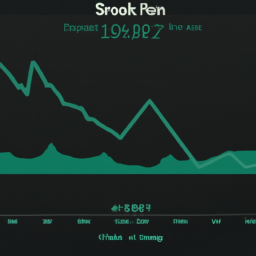Robinhood Markets Inc (NASDAQ: HOOD) is a popular app that allows users to trade stocks, ETFs, and cryptocurrencies without commission fees. However, the company is currently facing several challenges that could affect its future.
Shares of Robinhood Markets Inc have been on a rollercoaster ride since the company went public in July 2021. Users of the app have been decreasing, and the stock has been falling. On Friday afternoon, the shares were trading lower by 7.77% to $8.90, possibly due to profit-taking after the stock's recent gains.
Robinhood Markets Inc on Wednesday surpassed Wall Street estimates for first-quarter revenue, as the U.S. Federal Reserve's rapid rate hikes helped boost trading activity. However, the company's Q1 earnings report showed a decline in cryptocurrency trading, which is a significant part of Robinhood's business.
Robinhood co-founder and CEO Vlad Tenev looks to re-chart the company's future. Tenev has been pushing for Robinhood to expand its offerings beyond cryptocurrencies and commission-free trading of stocks and ETFs. As part of this effort, Robinhood will soon allow users to engage in 24-hour trading of selected exchange-traded funds and popular stocks such as Apple and Tesla.
However, Robinhood's plans to expand its offerings have not been without controversy. The company has faced scrutiny over its business practices, including its payment for order flow model, which allows it to make money by routing trades to market makers.
Robinhood's payment for order flow model has come under fire from regulators and lawmakers, who argue that it can create conflicts of interest and harm investors. The company has also faced lawsuits from customers who claim that its business practices have resulted in losses.
In addition to regulatory scrutiny, Robinhood has also faced technical challenges. The company's platform has experienced several outages, which have frustrated users and led to lost opportunities for traders.
Despite these challenges, Robinhood remains a popular app among young and inexperienced investors. The company has been credited with helping to democratize investing by making it accessible to a wider range of people.
Robinhood's success has also led to increased competition in the online brokerage industry. Traditional brokers such as Charles Schwab and E-Trade have lowered their commissions, and new entrants such as Webull and Public have launched similar apps.
To stay competitive, Robinhood will need to continue to innovate and expand its offerings. Tenev has said that the company is exploring the possibility of offering retirement accounts and other financial services.
In the meantime, Robinhood's users will continue to trade stocks, ETFs, and cryptocurrencies on the app. The company's success will depend on its ability to navigate the challenges it faces and chart a course for its future.
